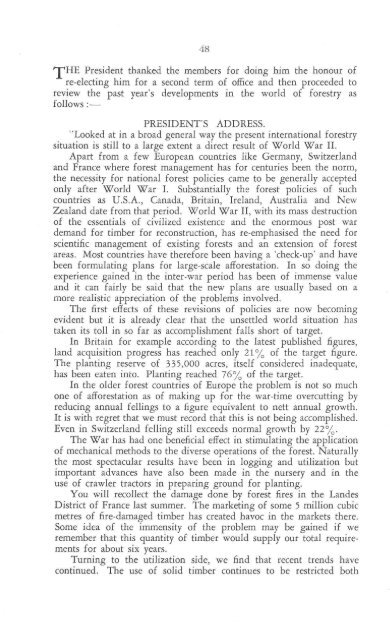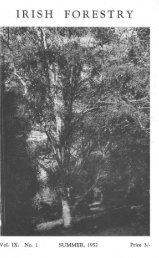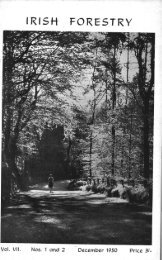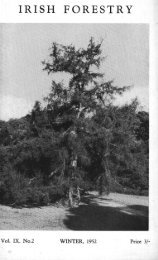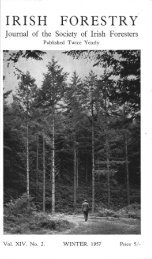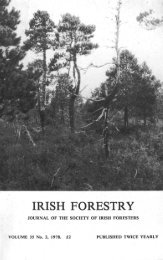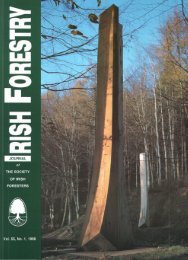Download Full PDF - 17.54 MB - The Society of Irish Foresters
Download Full PDF - 17.54 MB - The Society of Irish Foresters
Download Full PDF - 17.54 MB - The Society of Irish Foresters
You also want an ePaper? Increase the reach of your titles
YUMPU automatically turns print PDFs into web optimized ePapers that Google loves.
48<br />
THE President thanked the members for doing him the honour <strong>of</strong><br />
re-electing him for a second term <strong>of</strong> <strong>of</strong>fice and then proceeded to<br />
review the past year's developments in the world <strong>of</strong> forestry as<br />
follows :-<br />
PRESIDENT'S ADDRESS.<br />
"Looked at in a broad general way the present international forestry<br />
situation is still to a large extent a direct result <strong>of</strong> World War II.<br />
Apart from a few European countries like Germany, Switzerland<br />
and France where forest management has for centuries been the norm,<br />
the necessity for national forest policies came to be generally accepted<br />
only after World War 1. Substantially the forest policies <strong>of</strong> such<br />
countries as U.S.A., Canada, Britain, Ireland, Australia and New<br />
Zealand date from that period. World War II, with its mass destruction<br />
<strong>of</strong> the essentials <strong>of</strong> civilized existence and the enormous post war<br />
demand for timber for reconstruction, has re-emphasised the need for<br />
scientific management <strong>of</strong> existing forests and an extension <strong>of</strong> forest<br />
areas. Most countries have therefore been having a 'check-up' and have<br />
been formulating plans for large-scale afforestation. In so doing the<br />
experience gained in the inter-war period has been <strong>of</strong> immense value<br />
and it can fairly be said that the new plans are usually based on a<br />
more realistic appreciation <strong>of</strong> the problems involved.<br />
<strong>The</strong> first effects <strong>of</strong> these revisions <strong>of</strong> policies are now becoming<br />
evident but it is already clear that the unsettled world situation has<br />
taken its toll in so far as accomplishment falls short <strong>of</strong> target.<br />
In Britain for example according to the latest published figures,<br />
land acquisition progress has reached only 21% <strong>of</strong> the target figure.<br />
<strong>The</strong> planting reserve <strong>of</strong> 335,000 acres, itself considered inadequate,<br />
has been eaten into. Planting reached 76% <strong>of</strong> the target.<br />
In the older forest countries <strong>of</strong> Europe the problem is not so much<br />
one <strong>of</strong> afforestation as <strong>of</strong> making up for the war-time overcutting by<br />
reducing annual fellings to a figure equivalent to nett annual growth.<br />
It is with regret that we must record that this is not being accomplished.<br />
Even in Switzerland felling still exceeds normal growth by 22% .<br />
<strong>The</strong> War has had one beneficial effect in stimulating the application<br />
<strong>of</strong> mechanical methods to the diverse operations <strong>of</strong> the forest. Naturally<br />
the most spectacular results have been in logging and utilization but<br />
important advances have also been made in the nursery and in the<br />
use <strong>of</strong> crawler tractors in preparing ground for planting.<br />
You will recollect the damage done by forest fires in the Landes<br />
District <strong>of</strong> France last summer. <strong>The</strong> marketing <strong>of</strong> some 5 million cubic<br />
metres <strong>of</strong> fire-damaged timber has created havoc in the markets there.<br />
Some idea <strong>of</strong> the immensity <strong>of</strong> the problem may be gained if we<br />
remember that this quantity <strong>of</strong> timber would supply our total requirements<br />
for about six years.<br />
Turning to the utilization side, we find that recent trends have<br />
continued. <strong>The</strong> use <strong>of</strong> solid timber continues to be restricted both


